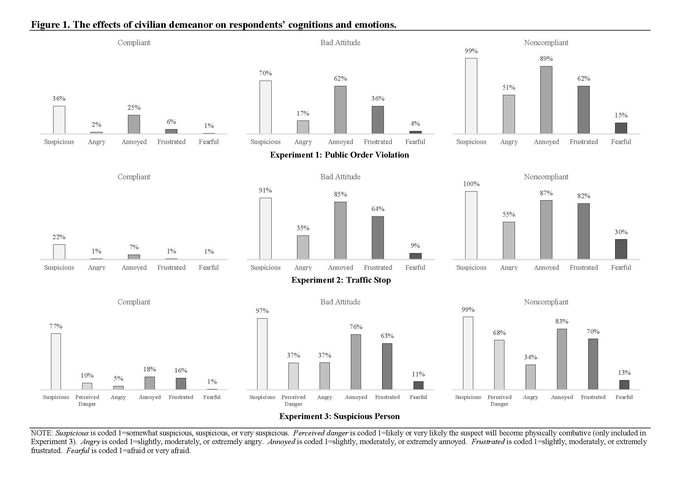Compliance, Noncompliance, and the In-between: Causal Effects of Civilian Demeanor on Police Officers’ Cognitions and Emotions
 Figure 1
Figure 1
Compliance, Noncompliance, and the In-between: Causal Effects of Civilian Demeanor on Police Officers’ Cognitions and Emotions
Abstract
Objectives: Police legitimacy can hinge on what happens in police-civilian encounters, yet much remains unknown about the socio-psychological processes involved in these bilateral interactions, especially those affecting officers. We integrate insights from policing research with theories and findings from scholarship on moral psychology, interpersonal strain, and victimization fear to develop hypotheses about the situational effects of civilian demeanor on officers’ cognitions (suspicion and perceived danger) and emotions (anger, frustration, annoyance, and fear). Methods: We administered a series of three randomized vignettes involving routine police-civilian encounters to 546 officers working in a large city in the southwestern United States. We randomized civilian behavior—compliant, bad attitude (compliant but disrespectful), or noncompliant—and the encounter type—offense-based versus dispatch initiated. Results: Demeanor exerts a large causal effect on what officers think and feel in police-civilian encounters. In each experiment, civilian hostility and disrespect increased officers’ self-reported suspicion, perceived danger, and antagonistic emotions (anger, frustration, and annoyance). In some cases, it also increased their fear. Conclusions: Each of these cognitions and emotions may separately influence police decision-making, and each carries unique policy implications. Our results also suggest the efficacy of experimental surveys to unpack the dynamics of police-civilian interactions.
This article was published open-access - you can download it for free by clicking on the “DOI” button above.